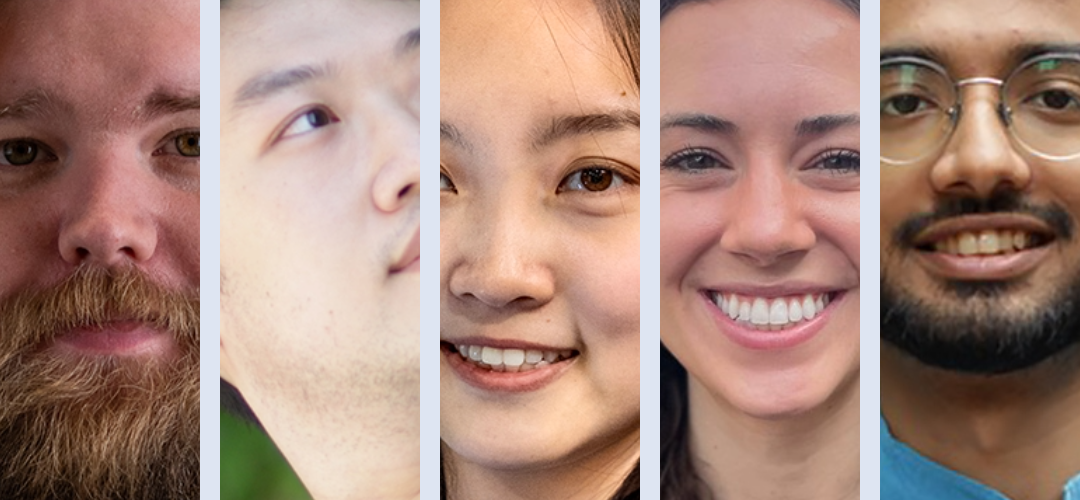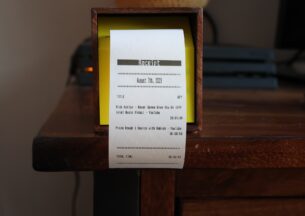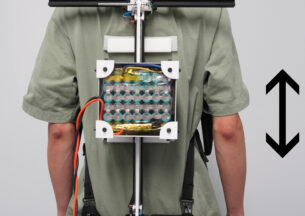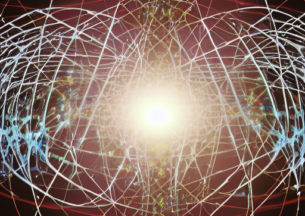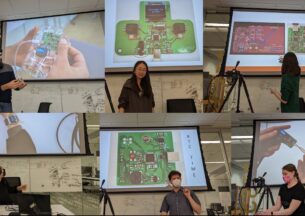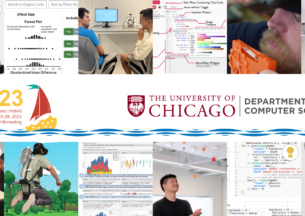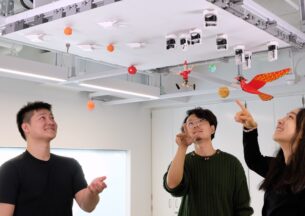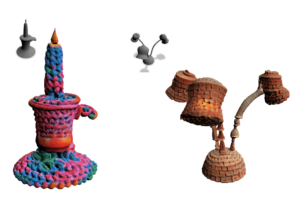Five UChicago CS students named to Siebel Scholars Class of 2024
Three students in the MS in Computational Analysis and Public Policy (MS-CAPP) program and two UChicago Computer Science PhD students were named to the 2024 class of the Siebel Scholars—a program that awards grants to 16 universities in the United States and other countries.
The University of Chicago Department of Computer Science was selected for the Siebel Scholars program in 2017. Since then, 33 UChicago CS students have been chosen by the Thomas and Stacey Siebel Foundation to join the group, which “recognizes the most talented students at the world’s leading graduate schools of business, computer science, bioengineering, and energy science, forming an active, lifelong community among an ever-growing group of leaders,” according to the foundation. This year the foundation selected 83 students to join its network of 1,800 scholars, researchers, and entrepreneurs.
This year’s class of UChicago CS Siebel Scholars includes students working on engineered devices that manipulate human senses; video analytics systems; developing algorithms to predict high-risk pregnancies; integrating technology within the congressional infrastructure; and policy projects using machine learning to discover energy-efficient strategies for enhancing building comfort. Read more about each student below.
Jas Brooks
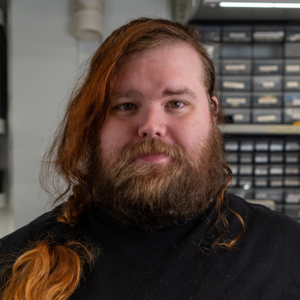 Jas Brooks is a computer science PhD student at the University of Chicago, advised by associate professor Pedro Lopes. Their research focuses on engineering devices that chemically stimulate and manipulate the human senses. These chemical interfaces have reduced power consumption for thermal feedback, miniaturized feedback mechanisms for haptic wearables, created novel modes of interaction for taste (forthcoming), and inspired new sensations like stereo-smell. Jas has published work at top Human-Computer Interaction (HCI) venues, including ACM CHI and UIST, with two Best Paper Awards at CHI. Their work has also been awarded an Honorable Mention in the Fast Company Innovation by Design Award for Experimental Design and covered in media publications like WIRED, Fast Company, Digital Trends, and IEEE Spectrum. Jas received support for their research from a National Science Foundation Graduate Research Fellowship. They are currently interning at Microsoft Research under the mentorship of Dr. Judith Amores Fernandez. In their spare time, they explore media archaeology, focusing on historical scent technologies (including the conservation of hardware scent devices, capturing oral histories from dot-com era scent tech companies, and uncovering scented film exhibitions from 1900-1959)—their co-curatorial work around scent media was a finalist for the 2022 Sadakichi Award.
Jas Brooks is a computer science PhD student at the University of Chicago, advised by associate professor Pedro Lopes. Their research focuses on engineering devices that chemically stimulate and manipulate the human senses. These chemical interfaces have reduced power consumption for thermal feedback, miniaturized feedback mechanisms for haptic wearables, created novel modes of interaction for taste (forthcoming), and inspired new sensations like stereo-smell. Jas has published work at top Human-Computer Interaction (HCI) venues, including ACM CHI and UIST, with two Best Paper Awards at CHI. Their work has also been awarded an Honorable Mention in the Fast Company Innovation by Design Award for Experimental Design and covered in media publications like WIRED, Fast Company, Digital Trends, and IEEE Spectrum. Jas received support for their research from a National Science Foundation Graduate Research Fellowship. They are currently interning at Microsoft Research under the mentorship of Dr. Judith Amores Fernandez. In their spare time, they explore media archaeology, focusing on historical scent technologies (including the conservation of hardware scent devices, capturing oral histories from dot-com era scent tech companies, and uncovering scented film exhibitions from 1900-1959)—their co-curatorial work around scent media was a finalist for the 2022 Sadakichi Award.
Kuntai Du
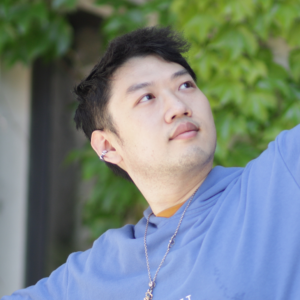 Kuntai Du is a fifth-year computer science PhD candidate advised by assistant professor Junchen Jiang at the University of Chicago. He has a fantastic publication record: one first-authored paper at SIGCOMM, one first-authored paper at MLSys, and two second-authored papers at SoCC and HotMobile. Kuntai’s advisor ranks him in the top 10% of all CS PhD students. In all of his papers, he’s demonstrated excellent leadership qualities, as the lead author or an advisor for newer students. He’s also well-known as a top researcher in his area of video analytics systems. Kuntai also holds a BS in computer intelligence science from Peking University in Beijing, China.
Kuntai Du is a fifth-year computer science PhD candidate advised by assistant professor Junchen Jiang at the University of Chicago. He has a fantastic publication record: one first-authored paper at SIGCOMM, one first-authored paper at MLSys, and two second-authored papers at SoCC and HotMobile. Kuntai’s advisor ranks him in the top 10% of all CS PhD students. In all of his papers, he’s demonstrated excellent leadership qualities, as the lead author or an advisor for newer students. He’s also well-known as a top researcher in his area of video analytics systems. Kuntai also holds a BS in computer intelligence science from Peking University in Beijing, China.
Miao Li
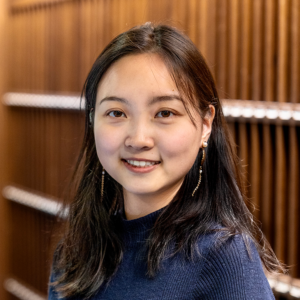 Miao Li, a student in the MS in Computational Analysis and Public Policy (MS-CAPP) program at the University of Chicago, holds health care and education very close to her heart. Miao led classes and after-school tutoring programs for children from lower-income households in New York. She has also developed an interactive dashboard to visualize food accessibility and restaurant business patterns in Cook County. Miao is currently working as a data engineering intern for an NGO in the Mississippi Delta, conducting regressions and exploring machine learning models for the development of an algorithm to predict high-risk pregnancies in the region. She holds a BA in international relations and psychology from New York University.
Miao Li, a student in the MS in Computational Analysis and Public Policy (MS-CAPP) program at the University of Chicago, holds health care and education very close to her heart. Miao led classes and after-school tutoring programs for children from lower-income households in New York. She has also developed an interactive dashboard to visualize food accessibility and restaurant business patterns in Cook County. Miao is currently working as a data engineering intern for an NGO in the Mississippi Delta, conducting regressions and exploring machine learning models for the development of an algorithm to predict high-risk pregnancies in the region. She holds a BA in international relations and psychology from New York University.
Madeleine Roberts
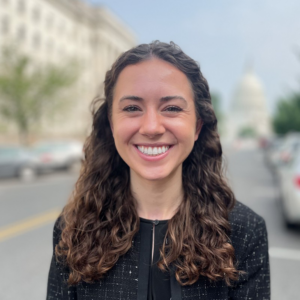 Madeleine Roberts, a student in the MS in Computational Analysis and Public Policy (MS-CAPP) program at the University of Chicago, is passionate about the intersection of public policy and computer science leading her to establish the Data, Ethics, & Policy (DEP) organization. As a researcher for the U.S. Congress in Washington, DC, she works to more effectively integrate technology within the congressional infrastructure, with the goal of improving legislative processes and facilitating constituent engagement. She helps on the ground locally by establishing a mentorship program to support STEM learning and encourage the younger generation to get involved in computer science. Madeleine is in her fifth year serving as an advisory board member for the University of Chicago chapter of KASEM, and she is also an active fundraiser for Chicago HOPES for Kids. She holds a BS in computer science, political science, and Spanish from University of Wisconsin in Madison.
Madeleine Roberts, a student in the MS in Computational Analysis and Public Policy (MS-CAPP) program at the University of Chicago, is passionate about the intersection of public policy and computer science leading her to establish the Data, Ethics, & Policy (DEP) organization. As a researcher for the U.S. Congress in Washington, DC, she works to more effectively integrate technology within the congressional infrastructure, with the goal of improving legislative processes and facilitating constituent engagement. She helps on the ground locally by establishing a mentorship program to support STEM learning and encourage the younger generation to get involved in computer science. Madeleine is in her fifth year serving as an advisory board member for the University of Chicago chapter of KASEM, and she is also an active fundraiser for Chicago HOPES for Kids. She holds a BS in computer science, political science, and Spanish from University of Wisconsin in Madison.
Divji Sinha
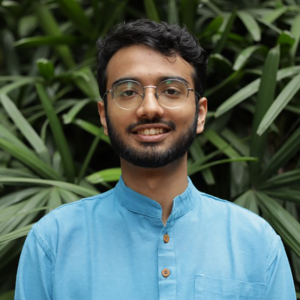 Divij Sinha, a student in the MS in Computational Analysis and Public Policy (MS-CAPP) program at the University of Chicago, prioritizes learning and growth. He used these priorities while working in Kengeri, Bengaluru at the Urban Informatics Lab at the Indian Institute for Human Settlements. Divij has blended his desire to tackle policy problems and his strong computer science skills to contribute to policy utilizing machine learning algorithms. Such projects include efforts to discover energy-efficient strategies for enhancing building comfort and creating survey tools for capturing GIS inputs for a project focused on mapping Chicago’s neighborhoods. Divij helps his peers succeed academically and has been awarded the Outstanding Peer Academic Support of the Year. He holds a BE in electrical and electronic engineering with a minor in politics, economics, and philosophy, from Birla Institute of Technology and Science in Pilani, India.
Divij Sinha, a student in the MS in Computational Analysis and Public Policy (MS-CAPP) program at the University of Chicago, prioritizes learning and growth. He used these priorities while working in Kengeri, Bengaluru at the Urban Informatics Lab at the Indian Institute for Human Settlements. Divij has blended his desire to tackle policy problems and his strong computer science skills to contribute to policy utilizing machine learning algorithms. Such projects include efforts to discover energy-efficient strategies for enhancing building comfort and creating survey tools for capturing GIS inputs for a project focused on mapping Chicago’s neighborhoods. Divij helps his peers succeed academically and has been awarded the Outstanding Peer Academic Support of the Year. He holds a BE in electrical and electronic engineering with a minor in politics, economics, and philosophy, from Birla Institute of Technology and Science in Pilani, India.
This story is a reprint from the Physical Sciences Division website.


